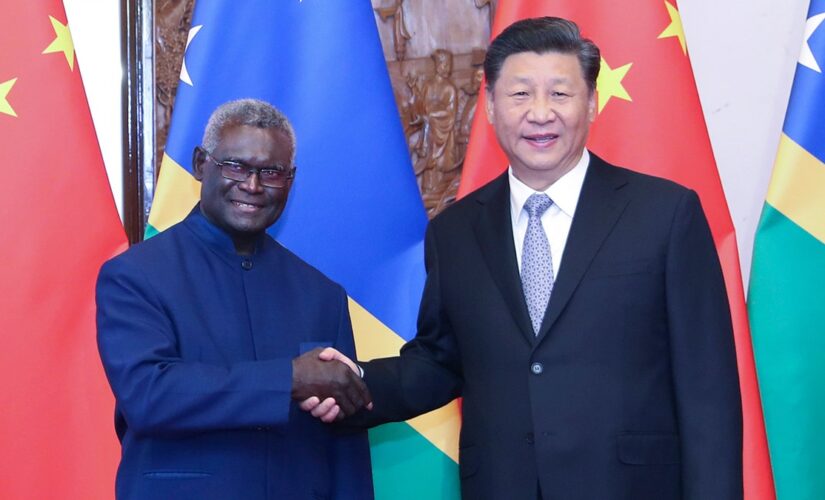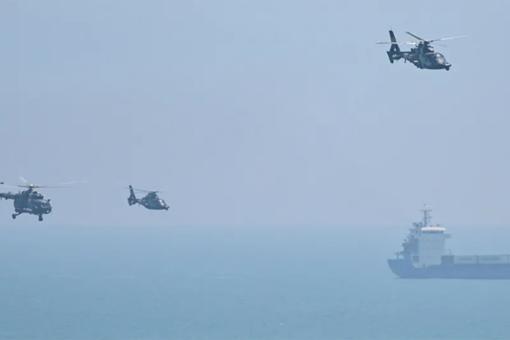NEWYou can now listen to Fox News articles!
There is “considerable unease” in Australia as a Chinese company looks to purchase strategically located land off the Island nation’s coast, an Australian professor told Fox News.
A Chinese state-owned company is in negotiations to purchase a forestry plantation in the Solomon Islands with a deep-water port and a World War II airstrip, according to the Associated Press. The land is situated in the South Pacific a little over 1,000 miles from Australia’s coast.
“This is unsettling on a number of levels,” said John Blaxland, an Australian National University professor of international security and intelligence studies. “These islands, if occupied and controlled by an enemy, would be able to isolate Australia from North America.
China signed a bilateral security pact with the Solomon Islands in the Spring, part of Beijing’s increasing activity in the South Pacific. The agreement highlighted “the risk of China seeking to interfere within our region,” Australia’s then-prime minister, Scott Morrison, said.
The Solomon Islands located in the Indo-Pacific region, a place of strategic value for China.
(Encyclopaedia Britannica/Universal Images Group)
The deal states that the Solomon Islands can call on China to send “police, armed police, military personnel and other law enforcement” to the country for various reasons, including “maintaining social order” and “protecting people’s lives and property.”
Blaxland said he fears that China has effectively co-opted the Solomon Islands’ government.
CHINA USES ‘UNFAIR TRADE PRACTICES’ TO GAIN ‘DOMINANT’ ADVANTAGE, YELLEN SAYS IN SOUTH KOREA
“There is considerable unease in Australia about what’s happening,” he told Fox News. “There is an overwhelming spike in the level of concern about China’s adversarial ambitions and its intentions.”
China’s “show of force in and around Taiwan” after House Speaker Nancy Pelosi’s visit earlier has only reinforced Australians’ fear of Beijing’s ambitions in the South Pacific, Blaxland added.
John Blaxland, a professor at the Australian National University, says China’s bid to purchase land in the Indo-Pacific region is “unsettling on a number of levels.”
(Teny Sahakian/Fox News )
Rather than placating China, Blaxland said the superpower’s aggressive diplomacy has encouraged Australia to strengthen its defense capabilities.
“The shift in mood in Australia is largely, I would contend, a response to China’s actions,” Blaxland, a former Australian army officer, told Fox News.
The relationship between China and Australia has deteriorated in recent years. The Australian government called for an independent inquiry into the origins of COVID-19, and China, in retaliation, imposed tariffs and other restrictions.
CHINA CONTINUES MILITARY DRILLS NEAR TAIWAN
China still remains Australia’s principal trading partner, according to Australia’s Department of Foreign Affairs and Trade.
Chinese President Xi Jinping meets with Solomon Islands’ Prime Minister, Manasseh Sogavare, in Beijing on Oct. 9, 2019.
(Xinhua/Yao Dawei)
CLICK HERE TO GET THE FOX NEWS APP
Aussies are paying “acute attention” to America’s response to China’s wolf warrior diplomacy, an aggressive style of coercive statecraft, according to Blaxland.
“There is a fine balance between our fear of abandonment coupled with a fear of entrapment,” Blaxland said. There’s a concern that an “overly assertive United States” could contribute to an escalation over Taiwan that would “draw Australia, as a close and trusted ally, into a fight that Australia would very much like to avoid.”
There is “nervousness” in Australia that the U.S. will default to military action if an issue arises with China, Blaxland told Fox News. “If it wants to compete in the Indo-Pacific,” the U.S. “needs to step up economically.”




